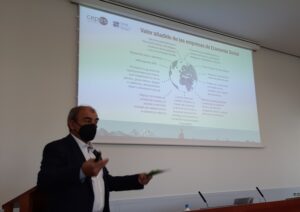On November 5, 2021 we had the opportunity to participate in the XXVIV ECRI Workshop (www.ehu.eus/ecri) various members of the Business Institute-Institute of Economics Applied to Business: Leire San-José, Sara Urionabarrenetxea, Jose Domingo Garcia and Ana Beraza. As a guest we had the pleasure of having Juan Antonio Pedreño, President of CEPES, which is the Spanish Business Confederation of Social Economy (www.cepes.es).
Juan Antonio Pedreño, President of CEPES
–
In the conference entitled “Social Economy Companies, a key business actor for the social and economic transformation of Spain and Europe”, three aspects were highlighted as relevant:
In the first place, it was highlighted that we are facing a unique moment for the promotion of the concept of Social Economy. Undoubtedly, the need to integrate the social economy into the social discourse is on the lips of public officials; since it has been a key element in the pandemic. Certainly, it has responded efficiently and this fact should be considered as an example for many other companies.
Second, his speech is aligned with the 2030 Agenda and with the sustainable development goals. Furthermore, social economy enterprises have always been considered per se social; however, at this time they must, not only be, but demonstrate it. Along these lines, we have agreed to promote collaboration systems between universities and CEPES to promote visualization systems of the social contribution that the Social Economy has in Spain.
Third, the future business fabric is largely sustained by the creation of companies, which are started by young entrepreneurs. Along these lines, it is found that we still have a lot to do, since only a very small percentage of the company created is in the social economy. This is paradoxical when young people are perfectly aligned with the values of the social economy (collaborative employment, equity, sustainability, democratic decisions, among others). Solving this problem will depend on the inclusion in education of this type of companies and on promoting and facilitating the creation of this type of companies for young entrepreneurs.
In short, after this event, the need for universities and organizations, in this case of the social economy, to collaborate was confirmed once again. Social transformation will only be possible if we work in alignment and expose the value of what the Social Economy represents.
– –


